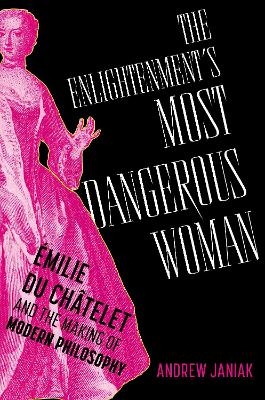
The Enlightenment's Most Dangerous Woman
Oxford University Press Inc (Verlag)
978-0-19-775798-7 (ISBN)
- Lieferbar (Termin unbekannt)
- Portofrei ab CHF 40
- Auch auf Rechnung
- Artikel merken
Just as the Enlightenment was gaining momentum throughout Europe, philosopher Émilie Du Châtelet broke through the many barriers facing women at the time and published a major philosophical treatise in French. Within a few short years, she became famous: she was read and debated from Russia to Prussia, from Switzerland to England, from up north in Sweden to down south in Italy. This was not just remarkable because she was a woman, but because of the substance of her contributions. While the men in her milieu like Voltaire and Kant sought disciples to promote their ideas, Du Châtelet promoted intellectual autonomy. She counselled her readers to read the classics, but never to become a follower of another's ideas. Her proclamation that a true philosopher must remain an independent thinker, rather than a disciple of some supposedly “great man” like Isaac Newton or René Descartes, posed a threat to an emerging consensus in the Enlightenment. And that made her dangerous.
After all, if young women took Du Châtelet's advice to heart, if they insisted on thinking for themselves, they might demand a proper education--the exclusion of women from the colleges and academies of Europe might finally end. And if young women thought for themselves, rather than listening to the ideas of the men around them, that might rupture the gender-based social order itself. Because of the threat that she posed, the men who created the modern philosophy canon eventually wrote Du Châtelet out of their official histories. After she achieved immense fame in the middle of the eighteenth century, her ideas were later suppressed, or attributed to the men around her. For generations afterwards, she was forgotten. Now we can hear her voice anew when we need her more than ever. Her lessons of intellectual independence and her rejection of hero worship remain ever relevant today.
Andrew Janiak is Professor of Philosophy and Bass Fellow at Duke University. For the last decade, he has co-led (with Liz Milewicz) Project Vox, a digital project that seeks to recover the lost voices of women who contributed to modern science and philosophy. Janiak is the author or editor of five previous books and numerous articles concerning the relationship between science and philosophy in the 17th and 18th centuries.
1. The Rise and Fall Of Émilie Du Châtelet
2. What Was the Scientific Revolution?
3. Du Châtelet's Vision of Science And Philosophy
4. The Enlightenment's Most Famous Woman
5. The Enlightenment's Most Dangerous Woman, Or The Making Of Modern Philosophy
6. Du Châtelet's Enlightenment: Philosophy for Freethinkers
Notes Bibliography Index
| Erscheinungsdatum | 05.09.2024 |
|---|---|
| Zusatzinfo | 10 |
| Verlagsort | New York |
| Sprache | englisch |
| Maße | 147 x 216 mm |
| Gewicht | 476 g |
| Themenwelt | Geisteswissenschaften ► Philosophie ► Geschichte der Philosophie |
| Geisteswissenschaften ► Philosophie ► Philosophie der Neuzeit | |
| Naturwissenschaften | |
| Sozialwissenschaften | |
| ISBN-10 | 0-19-775798-7 / 0197757987 |
| ISBN-13 | 978-0-19-775798-7 / 9780197757987 |
| Zustand | Neuware |
| Informationen gemäß Produktsicherheitsverordnung (GPSR) | |
| Haben Sie eine Frage zum Produkt? |
aus dem Bereich


